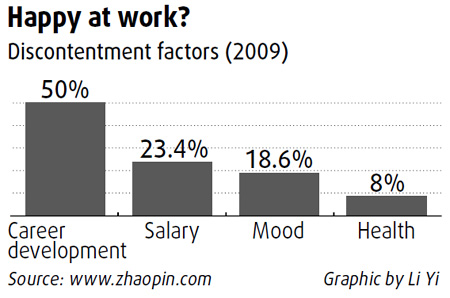Top Biz News
Careering out of control
By Wang Xiaotian (China Daily)
Updated: 2010-01-25 08:03
 |
Large Medium Small |

Li Ming, 28, a sales manager in Shenzhen, said he would leave his job this spring if his boss doesn't increase his salary in 2010.
"My expectation is not high at all," he said. "Businesses in my industry are getting prosperous again from the bottom. Why can't we get some compensation in 2010 for our slashed salaries since 2008?"
Like Li, many Chinese office employees are not optimistic about pay rises this year and would like to jump ship if their salary doesn't increase, according to a survey conducted by Zhaopin Ltd, one of the best known human resources service providers on the mainland.
Nearly 30 percent, the biggest portion of the 6,000 office employees quizzed at the end of 2009 said they hoped for a 20 percent pay rise in 2010. A total of 17.5 percent of the respondents expected less.
Among all respondents, more than 66 percent said they didn't get any rise in salary in 2009.
More than 50 percent indicated they would seek a new job if their salary remained the same as 2009.
"Although the economic slowdown made employees more careful and conservative about their career development, they would still think about moving if their salary remained stagnant for two consecutive years," said Hao Jian, a senior career consultant of Zhaopin.
"This spring will be a trial for both companies and employees. It would be wise to prepare for possible change."
Hao added this March after the Chinese traditional Spring Festival would mark the real start to the New Year for Chinese office employees and many would choose to leave their jobs after getting their bonus in January or February.
High churn rate among Chinese employees has become a striking feature of the world's biggest labor market. It is different from other Asian countries such as Japan, said Zeng Xiangquan, dean of labor relations and human resources at Renmin University of China.
| ||||
According to a newly released survey by Manpower, 62 percent of human resources managers quizzed would prefer to keep their staff in 2010 by setting up career development goals and providing individual training or job rotation opportunities for them, but only 23 percent of them would be willing to raise salaries and other payments.
Despite employees pinning their hope on a higher salary and a better job, nearly 40 percent of respondents said their own performance in the workplace disqualified them, with only 4.5 percent saying they were satisfied with themselves in 2009, according to Zhaopin. A total of 50 percent rated career development as the most unsatisfactory factor in their work, while salary ranked second with a vote of 23.4 percent, followed by mood and health issues.













